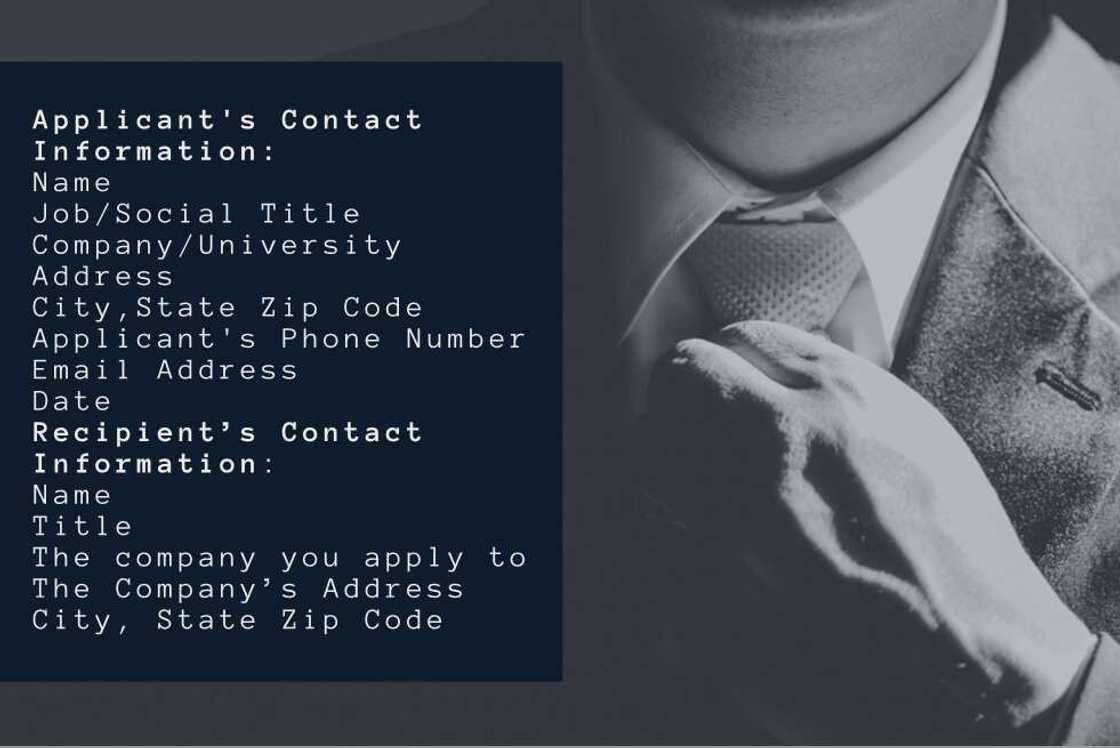Writing an internship letter: top tips and examples
Writing an internship cover letter is not just about sounding professional but showcasing goals, intentions, and motivation. From using a clear call to action to choosing a formal closing tone, every detail matters. Resume expert Abdulrazaq Abioye Amoo stresses keeping it simple, relevant, and result-driven to grab recruiters’ attention.

Source: UGC
TABLE OF CONTENTS
Key takeaways
- Start your letter with a formal salutation like “Dear Mr./Ms.” to maintain professionalism.
- Show genuine interest by explaining why you are drawn to the company’s mission, reputation, or values.
- Always include a call to action in your cover letter to guide recruiters to your resume.
- In cases of extensive experience, highlight key achievements in your cover letter to grab attention early.
How to write a cover letter for an internship?
Jenny Blakesley (the head of education and student outcomes at the University of Cambridge ) in her book 'How to write CVs and cover letters' mentioned:
“The cover letter is often the first thing the recruiter sees and will set their expectations for what is to follow. A good cover letter will highlight your key strengths and motivations for wanting to work in a particular organisation; the CV will then go into more detail about what you have achieved. The recruiter will form an impression of you based on both documents.”
The task of the cover letter is to tell about your goals, intentions, and motivation so that a potential employer would like to meet with you.
1. Contact a recipient
You must contact a recipient in accordance with the requirements of a formal business style.

Source: UGC
Start the first line of the message with the salutation. You may use the words "Dear Mr. /Ms X. " depending on the name, position, and gender of the contact person. Do not write "Hey" or "Hello." You must sound very formal and reveal your respect. Therefore, make sure that you know how to spell the name of the HR manager, review the website, or call the company to ask one more time. The power of calling someone by name (even in written form) is significant. It attracts the attention of the person you are going to speak to. If you make a mistake in someone’s name, it will also attract attention, but in a very negative sense.
If you cannot find out who you are going to communicate to, use a formal phrase “To whom it may concern.”
2. Introduce yourself
Tell a recipient your name and status (for example, a third-year biology student at the University of Lagos). Write what exactly you want to get from a recipient. In your case, it will be an internship.
Indicate how you learned about the internship (found the ads online, read in the newspaper, or learned from friends). If you have mutual friends, then tell them as soon as possible. For example, you could write "program manager X... / my professor X... suggested me to contact you."
3. Tell about your readiness to start work
Concentrate not on what you have done but on what you are ready to do:
- Present your skills and qualifications
- Indicate the estimated start and end dates of your internship
- Explain whether your schedule is flexible
- If you are ready, for example, to dedicate a full working day during the summer, explain this
- Specify the number of hours per week you can work
- It is quite logical that the more you can work, the better it is
4. Indicate the purpose of the internship
Do you need the practice to study? If it suits you, then indicate that you need an internship primarily to gain experience, and you do not require the list of job duties and compensation. Besides, mention the skills you hope to acquire during your internship.
5. Tell why you liked the company that you had chosen
Mention what (in your opinion) the company is proud of. However, avoid mentioning any negative news and keep a positive tone in the correspondence. For example, you could write that a company has an excellent reputation, and you appreciate their commitment to providing volunteer assistance to homeless animals.
6. Leave your contact information
You must leave your contact information: name, email address, phone number, and specify the time when you are available. You may write: "You can reach me by phone, and also contact me by e-mail. If you cannot contact me, I may call you back (next Monday, for example)."
7. Thank the reader
Thank the reader politely for the time he or she has spent viewing the letter. End your message with warm words such as "With respect", “Thank you for considering my application”, or "With best regards." Do not use just "Thank you" or just "All the best" to complete your business correspondence, as long as it is considered informal. Indicate your full name and not just your first name.

Source: UGC
8. Think about the attachment to the letter
It will be your resume. Do not attach your resume to an unsolicited e-mail for an internship. If a company does not actively search for interns, then employees may not want to invest (especially if this contradicts their information security rules at workplaces). However, if you are asked to send a resume in the advertising brochure, attach the document in PDF format (and not Word, where the formatting may be lost/changed during the opening on another system).
Expert tips: How to close a cover letter
Abdulrazaq Abioye Amoo, a seasoned resume expert, explained in an interview that when writing your cover letter, whether for an internship or full-time employment, don’t just trail off at the end like an awkward goodbye at a party. He said a call to action is a must:
The reason is that there are situations where the recruiter will see your cover letter first. Therefore, you should refer them to your resume for more information about why you are a good fit for the position and why you have more experience, so they can check your track record.
They (recruiter/hiring manager) can check whether your skill sets are a fit for that job. So, if you don't include a call to action, is just like sending a blank letter.
Abdulrazaq also mentioned that when closing your cover letter, keep it short and simple, while maintaining a formal tone. He said you can try phrases like:
- "I appreciate you for considering my application, and I look forward to discussing it with you at your convenience."
- "I would appreciate it if you could look at my resume for more information about my candidacy." OR "Kindly take a look at my actual resume to prove my candidacy for this opening."
Tell stories with numbers (if you have them)
The expert shared a story of one of his clients, whose cover letter alone landed her an interview. He said:
She has over three decades of experience. And after we tried as much as possible to make the resume concise, we still went on to four pages because her experience was so impactful. She was making figures. She was in the sales and marketing industry. And those figures are significant.
What we did on her cover letter is that I actually took some recent figures she had from some recent companies and put them there. And she was like, when she was speaking to the recruiter at the interview, the recruiter told her, 'Do you know I didn't go through your resume?'
READ ALSO: How to write an application letter for job vacancy?
What are the best examples of an internship letter format?
Below, you may find several online examples of cover letters for an internship. They are short and informative. Read them and try to create your own.
- Cover letter for a scientific research internship
- Cover letter for an internship position
- Cover letter form example
What are the essential tips for writing an internship letter?
Not only the content but also the format matters for an employer. With the help of the following tips, you will find out not only what to write but also how to write a good letter.
- First of all, tell the reader briefly about your qualifications and experience. Create only a few sentences about course projects and previous work experience, and also about the presence of any skills necessary for the job. Saddleback College Resume Survey showed the following results considering cover letter length: 12.6% of employers responded to a full-page text; 43.7% responded to those applicants who wrote 1/2 page; 24.1% mentioned that the shorter the cover letter is, the better, and the other 19.5% had no preference. So, try to write a small, but informative and useful text with only high-quality information.
- Demonstrate how your knowledge can be beneficial for the organisation. Add information about former work and volunteer activities, and explain how the experience gained earlier prepared you for the internship. Emphasise how you can contribute to the improvement and development of the organisation. Your potential employer must believe that you will be able to cope with the tasks.

Source: UGC
- Describe your work experience with strong verb expressions. Instead of writing: "I have been training in the marketing department for two years…" loudly declare that, as an intern in the marketing department, for example, you created original and fresh content, elaborated electronic and printed advertising brochures, and developed the market using social networks for business. Show how confident you are!
- Mention your academic and non-academic successes and achievements. If you acted as a leader of a group, describe your responsibilities and achievements. Did you head a committee or commission? Did you train a sports team? Speak about it briefly, not to distract a reader’s attention.
- Instead of using adjectives to describe yourself, use specific examples that demonstrate your qualities. For example, instead of saying "I am an ambitious student," write "I was constantly in the list of top three activists in my group."
- Do not just copy cover letters from the Internet. If you can find a text on the web, your potential employer may find it too. So be creative and avoid plagiarism.
- Proofread, proofread, and one more time proofread your text! No one will think that you are an attentive and serious person if you can not write correctly. Imagine yourself in the place of your HR manager. Would you consider a text with mistakes among other well-written ones? The answer is obvious.
- Creative writing and humour in your message are relevant only if a company can be included in that small percentage of enterprises for which originality and humour are a part of their professional activities and are in line with their internal corporate culture.
So the secret of a good internship letter is in its style, conciseness and qualitative content. Internship letters focus on the interests of the company, and not on the personal interest of the candidate. Show that you know what a company needs and the position will be yours!
Source: Legit.ng

Adrianna Simwa (Lifestyle writer) Adrianna Simwa is a content writer at Legit.ng where she has worked since mid-2022. She has written for many periodicals on a variety of subjects, including news, celebrities, and lifestyle, for more than three years. She has worked for The Hoth, The Standard Group and Triple P Media. Adrianna graduated from Nairobi University with a Bachelor of Fine Arts (BFA) in 2020. In 2023, Simwa finished the AFP course on Digital Investigation Techniques. You can reach her through her email: adriannasimwa@gmail.com

Mary Ugbodaga (Lifestyle Journalist) Mary Ugbodaga is a Legit.ng journalist with 7 years of experience in journalism and media communications. She graduated from Covenant University in 2018 with a Bachelor's degree in Mass Communication/Media Studies. Mary previously worked as a journalist at TheCable, CNBC AFRICA, Voice of Nigeria, KPMG Nigeria. Email: mary.ugbodaga@corp.legit.ng.

